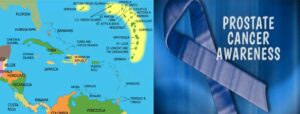
[Reprinted: The Carib News, 11-7-2020]
Recently NBC’s weatherman and morning TV co-host Al Roker revealed his diagnosis of prostate cancer and will be taking time off to battle the disease.
The 66-year-old urged others at risk — particularly Black men — to ensure they see a doctor and get the proper checkups to stop cancer that is very treatable if detected early.
It is worthy to note that according to a report from the World Health Organization (WHO), prostate cancer has led to male cancer incidence, or new diagnoses, in 96 countries since 2012 and it is the leading cause of death among men in 51 countries.” (2019)
Prostate cancer is the second leading cause of cancer diagnoses and the sixth most common cause of death from cancer among men globally.
A recent study from the Caribbean Public Health Agency and the United States Centers for Disease Control and Prevention (CDC), found that prostate cancer accounts for 18% – 47% of cancer deaths in the Caribbean region, making it the leading cause of male cancer deaths and the third leading cause of male deaths overall.
In the Caribbean, there are also many cultural and social norms that are contributing to these disturbing trends but paying attention to diet, exercise, and frequent prostate screenings can lower the risk for men.
In 2015, the age-standardized mortality rate from prostate cancer among Caribbean men was estimated to be 50 per 100,000, which is double the mortality rate of first world countries like the US and the UK.
Despite the decrease in rates among many industrialized countries, the Caribbean rates have increased by nearly 40% since 1990.
In 2018, a letter sent to the editor at PAHO warned that “the high rate of mortality from prostate cancer in the Caribbean poses a huge public health challenge for the area.”
In terms of overall rankings from the World Cancer Research Fund, Guadeloupe, Martinique, and Barbados have the highest age-standardized rates of cancer in the region, and the 1st, 2ndand 4thhighest rates in the world respectively.
Statistics from the Bahamas are particularly disturbing as the country ranks 14thhighest age-standardized rate in the world. According to an October 2019 article in Uro Today, 70-80% of Bahamian patients present with advanced prostate cancer which indicates that late screening is a major issue.
In addition to the ancestral and genetic predisposition to the disease, Caribbean men can lower their risk by limiting high-fat foods, increasing their intake of vegetables and fruits, being active, and engaging in regular screening after the age of 40.